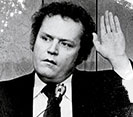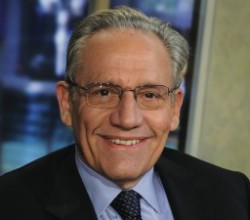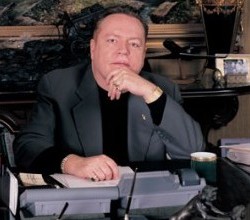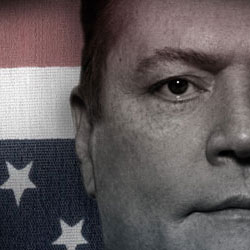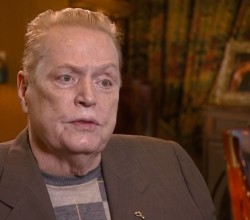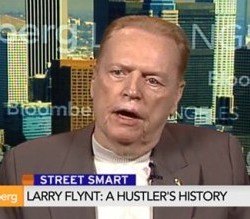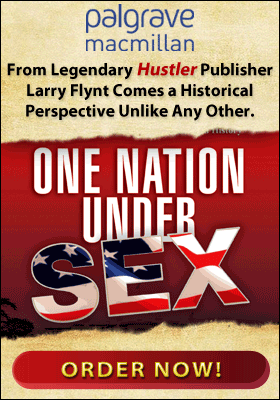Vincent Bugliosi – Divinity of Doubt
THE ONETIME CRIME FIGHTER WAGES WAR WITH BUSH AND RELIGION
Interview by Kimberly Cheng for HUSTLER Magazine
As a Los Angeles County prosecutor, Vincent Bugliosi had a perfect record in murder convictions. He is best remembered for the Sharon Tate/ Charles Manson case. Of the 106 felony cases he tried, Bugliosi lost only one. Since leaving public service, he has written 11 books on crime, three of which have topped the New York Times bestsellers list. His first,Helter Skelter—which chronicled every aspect of the Manson Family’s gruesome 1969 killing spree—went on to become the biggest-selling true-crime book in publishing history. Also enjoying critical acclaim, Bugliosi is a threetime recipient of the Edgar award, the highest literary honor devoted exclusively to the crime-and-mystery genre. Outraged by the deaths of U.S. servicemen and civilians during the Iraq War, Bugliosi penned The Prosecution of George W. Bush for Murder. In a startling departure from the subjects of law and government, Bugliosi’s latest book— Divinity of Doubt: The God Question—takes aim at organized religion, specifically the Bible. He stopped by HUSTLER recently to discuss his efforts to indict Bush and why he believes Divinity of Doubt will shake the very foundations of Christianity.
HUSTLER: What has happened since The Prosecution of George W. Bush for Murder was published in 2008?
VINCENT BUGLIOSI: This project about prosecuting Bush for murder is still very much alive. We have a documentary based on the book that will be going into postproduction very soon, hopefully for the big screen. But much more importantly than the book or the documentary is a 96-page report on every conceivable legal defense that George W. Bush, Condoleezza Rice and [Dick] Cheney could possibly raise to a criminal indictment against them.
I don’t want this to be misinterpreted in any way, but you should not be shocked if, within a year, there’s an article saying a criminal grand jury investigation has been launched against George W. Bush. It will not be on a federal level. [President Barack] Obama has already shown he has no courage to do this. He told George Stephanopoulos, “I don’t want to look at the past. I want to look at the future.” What Obama calls looking at the past, I call justice. Every criminal prosecution, without exception, is for past criminal behavior. I mean you can’t prosecute someone for what they might do in the future.
I want to make clear: I have no firm commitment on this. I’m not saying there’s going to be a prosecution. What I’m telling you is I’m making progress, and it’s very much alive. I do not want this guy to get away with murder.
George W. Bush, in my opinion, is responsible for the murder of over 4,500 American soldiers and well over 100,000 innocent Iraqi men, women, children and babies—and he’s enjoying life to the fullest.
You said a grand jury investigation isn’t going to be conducted at the federal level. What does that mean?
Preferably it would be done on a federal level, but [U.S. Attorney General Eric] Holder and Obama are totally out of it. The 50 state attorneys general I’ve contacted aren’t willing to go ahead. If this happens, it will be at a local level. It will be from one of the district attorneys in this country.
If this is taken to a grand jury—and I would probably be the one doing that— almost assuredly after the indictment, this case would go all the way up to the U.S. Supreme Court. They don’t have the power in their legal arsenal to prevent the indictment, as far as I know. They would have the power to prevent the case from going forward by coming up with some cockamamie legal argument like they did in Bush v. Gore, the [Equal] Protection Clause, which was nonsense and didn’t apply. But they can’t just say we don’t like this case. So this case would be taken under submission, and when the [Supreme] Court issues an opinion—probably the longest opinion in the history of the Court—we’ll already have at least two against us: Justice Antonin Scalia and Justice Clarence Thomas. I can say publicly that they’re disgraces to the legal profession.
Chief Justice John G. Roberts and Justice Samuel Alito most likely will be against us. It will probably come down to Justice Anthony Kennedy. I guess the nation would be divided at that point. The main thing is getting this guy [George W. Bush] into a courtroom and letting an American jury decide whether he is guilty or not of murder.
Tell us about your new book.
Divinity of Doubt: The God Question is the most explosive, revolutionary book that’s come down, within memory, in the area of God and religion. In my book, I demolish Richard Dawkins, who is the number one atheist in the world—the ayatollah of atheism, according to the L.A. Times. He wrote The God Delusion and sold a million-and-a-half copies.
He’s trying to be serious, and this is what he said: “Since the universe is so extremely complex, for there to be a God, he’d have to be more complex than the universe he created. I find that highly improbable.” That is such a vapid argument. It’s childlike.
You’ve said your book will shake the very foundations of Christianity.
If accepted as true, yes. I’m not the brightest guy in the world, but for whatever reason I seem to see what’s right in front of me in its pristine condition, uninfluenced by reputation or hoopla whereas most people see what they expect to see, what they want to see, what conventional wisdom tells them to see.
Frank Schaeffer, one of the founders of the Religious Right, grew up in a family that was immersed in Christianity, God, etc. His father was a top theologian when he died; [President Ronald] Reagan praised him to the heavens. Frank Schaeffer’s mother was a missionary. Schaeffer himself was a theologian and a preacher. He gave a review of my book, and it’s very telling what he said: “I found myself walking around the house following my wife reading passages to her.” Schaeffer left the Religious Right years ago because he found out something that I’ve been saying for years. They [the Religious Right] are anti- American.
I testified before the House Judiciary Committee for the Bush book. Republicans tried to shut me down, so members of the media came up to me later and asked why. I said, “I’ll tell you why: They’re more Republican than they are American. They pledge allegiance to the Republican Party, not the American flag.”
Divinity of Doubt challenges the concept of free will.
You hear people say all the time that God gives all of us free will. If you challenge them, they say, “It’s in the Bible.” Well, in doing research for this book, I found out that contrary to popular belief, the Bible does not say there’s free will. In fact, it says the precise opposite. Do you recognize the enormous ramifications of this?
If there’s no free will, then a murderer can’t be held accountable because God directed him to do it.
Absolutely. How do you explain God’s punishment of evildoers—not just in our life here, but in the afterlife—if what they did was preordained by God? Romans 11:32 goes so far as to say that God “consigns all men to disobedience.”
Here’s another point in the book: the immortality of the soul. It turns out immortality of the soul was a pure invention of Plato in the 4th century B.C. that Christianity was forced to embrace because without the immortality of the soul, there’s no life after death. The body doesn’t survive, and without life after death there’s no Heaven and Hell. I would pose the rhetorical question: How does Christianity survive without Heaven and Hell? This is what they offer or threaten their followers with.
Is it your position that the Bible is BS?
No. I’m simply saying that if you base what you’re saying—the free will—on the Bible, well, that’s not what the Bible says. I’m not attacking the Bible. I’m attacking Christianity.
But you’re pointing out discrepancies within the Bible.
That raises an interesting point because Judaism and Christianity believe that every word of the Bible is inspired by God. The problem there is, if every word is inspired by God, how can there be so many contradictions? How can he inspire one author of one Bible book to say something that is in direct contradiction with another passage he [God] also supposedly inspired?
I think the Bible is certainly the most important and influential book ever written. It tells the greatest story, fictional or otherwise, ever told. It’s a book of enormous wisdom and profundity, no question about it. On the other hand, the question has to be asked: If what I say is true, how do you keep the doors to these churches—thousands upon thousands around the world—open?
Maybe it’s not a question of what’s logical but what’s comforting. Religion offers comfort.
Of course! I think Petronius, the Roman satirist, said the gods came into the world out of fear, fear of the unknown. People want to believe in this stuff, and I don’t denigrate faith. [Russian author Leo] Tolstoy said it’s the biggest force in nature. It’s lit many candles of warmth throughout the years, softened pangs of fear. But let’s not confuse faith with the object of the faith. They’re not synonymous.
You’re wedded to logic.
That’s right. It’s my only master. The book is based on the evidence. It’s pretty hard to attack it because I give several biblical citations for everything I say.
I eliminate prayer for all intents and purposes. If someone prays for something and they get it, they say, “God answered my prayers.” That means he’s got the power to answer prayers. He’s all-powerful. Well, if he has the power to answer prayers, how can we possibly say he’s all good when we know to a 100% certainty that he nearly always turns down the praying party when that party needs him the most?
Doesn’t that tell us that not only is God not all good, but when we happen to get something as a result of our prayer, it had nothing to do with him? All Jewish and Christian theologians that I know of agree that God either caused or allowed everything to take place. They almost have to say it because if they didn’t, they’re saying God isn’t all-powerful.
The Holocaust, Hurricane Katrina, I don’t know who caused them, but God allowed it.We have catastrophes like 9/11, and people immediately run to their church or synagogue, and they pray for the victims to the entity who either caused or allowed this horror to take place. I don’t understand that.
Maybe it’s because religious people feel they’re playing some role in the healing process. They’re doing their part. It’s partially self-serving.
My view is that Christianity, if it insists, can have its God. But if it has any respect for logic, it’s got to redefine who he is. He can’t be all good and all-powerful at the same time. The Christians’ comeback is that God gives all of us—including Hitler and Stalin—free will. He’s not responsible for how we exercise it. God is supposed to be all good.
You were raised Catholic?
Yeah. My first confrontation in the area of God and religion was with this monsignor. He was a gray-haired eminence. He’d come into our class maybe once every two weeks, and he’d talk about God, the all good, the all-powerful, the all knowing. I was maybe nine at the most. I said to him, “Monsignor, if God is allpowerful, all good and all knowing, why does he put people on this Earth he already knows are going to end up in Hell?”
He said, “Well, that’s a good question for someone your age, and I have the answer for you. God gives all of us free will. When we come to that fork in the road, it’s up to us to decide. He’s not responsible for whether we take the road that leads to Heaven or the one that leads to Hell.”
I came back with, “Yes, but if you say that he’s all knowing, he already knows what direction we’re going to go in, so I still can’t figure out why he puts people on Earth who he already knows are going to end up in Hell.” The monsignor kind of coughed nervously and said, “We’ll take it up at a later time.”
Can we bait you into discussing the bigger question of whether God exists?
I’m an agnostic. Atheists do not believe in God, and I’m very harsh on atheism. I like to tell people I have someone rather bright on my side. His name is [Albert] Einstein. Einstein was an agnostic. Interestingly enough, [Charles] Darwin was also an agnostic even though most evolutionists are Atheists. I believe that the question of whether or not God exists is an impenetrable mystery beyond human comprehension.
Einstein said, “The problem is too vast for our limited minds.” And I just feel the most responsible and reasonable position to take on the issue of God’s existence is that of agnosticism. I love Gertrude Stein’s great nonliterary articulation. She said: “There ain’t no answer. There ain’t going to be any answer. There never has been an answer.That’s the answer.” And then Clarence Darrow, the great criminal defense attorney in the ’30s, said, “I don’t purport to know what ignorant men are sure of.”
What is your most fervent hope that Divinity of Doubt will accomplish?
I’m always educating people in my books. I lecture to people who are brighter than I am and older than I am. I believe in the Socratic imperative that the truth is more important than anything else. I’m not trying to throw a wrench in anything. I’m just pursuing what I perceive to be the truth. But this book is so revolutionary and stunning that people refuse to accept it. It’s extremely powerful. You will never think about God or religion in the same way ever again.

